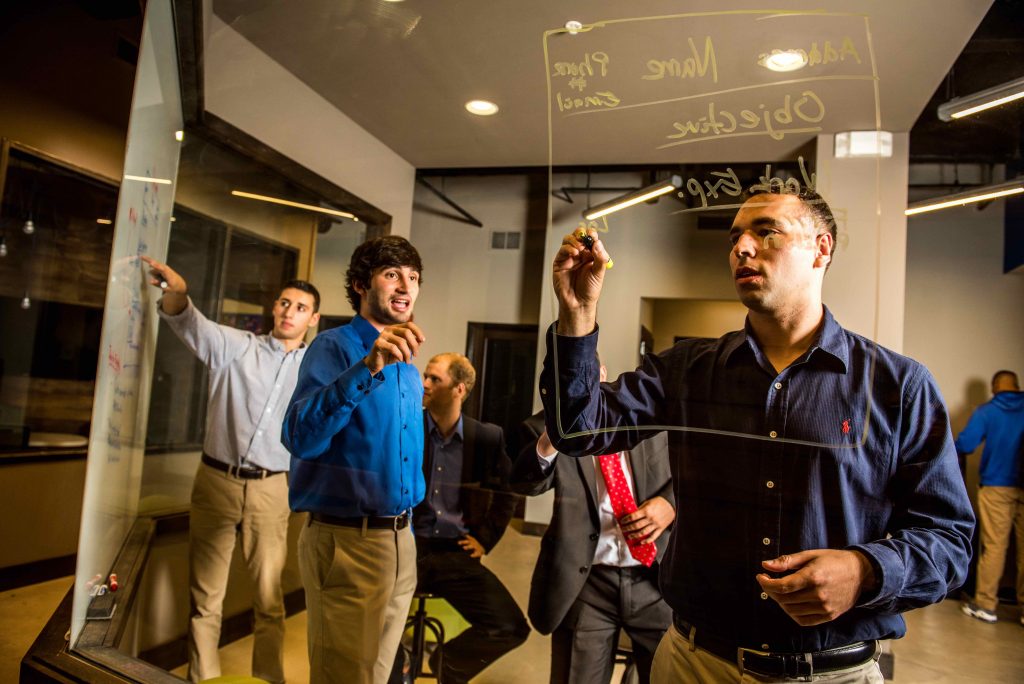
In order to give those in need a second chance, Binghamton University alumni at Lazarus Rising are helping homeless people write résumés.
With a personal mission to combat homelessness through professional encouragement, the nonprofit organization offers résumé-building sessions and mock interviews in an effort to prepare homeless individuals for the job search. The ultimate goal is to help homeless populations find employment.
According to CEO Danny Graziosi, ’18, the organization was created as a long-term solution to tackling homelessness, as opposed to offering more short-term solutions such as food and shelter.
“Giving people food and having shelter is really important — that’s a huge step of them rebuilding their lives and they need that support,” Graziosi said. “But I always thought that the problem with that is like, ‘Give a man a piece of bread and you feed him for a day; teach him how to fish and you feed him for a lifetime.’ This is a very similar idea where if we personally teach them how to make a résumé and we curate a résumé for them — that’s something they tangibly have where even if they fall in hard times again, they have that piece of paper that can help them get a job.”
Volunteers at the nonprofit separate their trips into two different phases, with phase one involving building a personal connection with participants at the shelter and learning about their backstory and work experience. After the first trip, volunteers will create a résumé for the participant before going on their second trip where they prepare participants for mock interviews.
Originally founded by Graziosi’s friends Matthew Rojas and Matthew Sobel at the University of Delaware in 2015, the organization started at Binghamton University after Graziosi transferred to BU from Suffolk County Community College in 2016.
However, it has since expanded beyond college campuses to larger regions, drawing on young professionals in a variety of areas. Currently, Lazarus Rising has chapters in Binghamton, New York City and Los Angeles, among other locations. More than 225 trained volunteers work with more than 400 participants. According to Jake Oppenheim, ’17, chief strategy officer at Lazarus Rising, this expansion is driven by new volunteers working outside college campuses.
“It’s hard to keep clubs and things going — that’s why we’ve been going to more major cities and using college campuses to help us build our volunteer base,” Oppenheim said. “But we’re still on universities, we’re still looking at universities. It’s not like we’re removing them, we’re just trying to figure out how to better improve the turnover.”
Drew Barkin, president of the BU chapter of Lazarus Rising and a first-year graduate student studying accounting, said he is currently working toward getting the club chartered by the Student Association. He said he hopes this will prompt more people to join the organization.
“Currently, we have around 10 members and most of our members come from Alpha Kappa Psi — that’s kind of how we initiated it,” Barkin said. “We’re hoping the chartering process will open it up to more people outside of organization and get a few more residents.”
According to Oppenheim, Lazarus Rising is different from other organizations because everyone is doing the work for free.
“A lot of these shelters might have somewhat of a service like this, but it’s definitely not as personalized, not as scalable and it’s not as passionate even, honestly, because it’s all pro bono for everyone involved,” Oppenheim said.
For Graziosi, realizing that their work makes a real difference for people who are struggling is what makes all their efforts worth it.
“A lot of people feel like they can’t contribute back to society because they don’t see their worth and we try to help them find their worth through their skills and their résumé,” Graziosi said. “Going to the shelters and actually working with these people reminds you exactly why you’re doing what you’re doing.”


